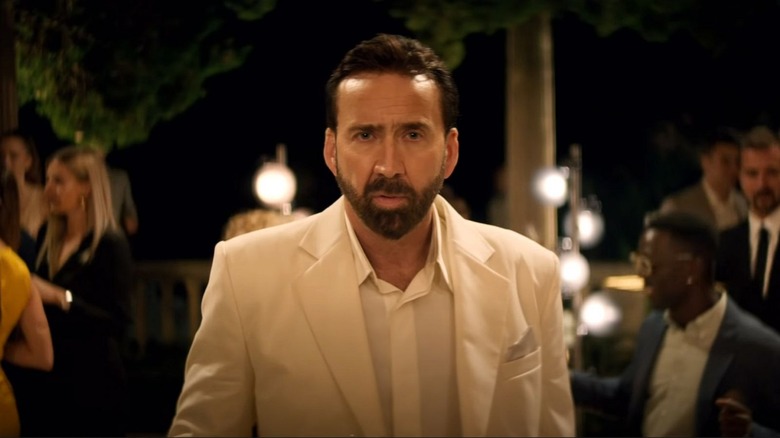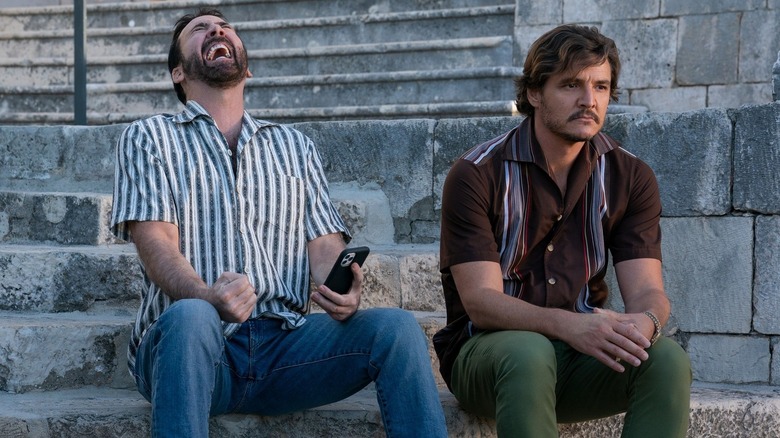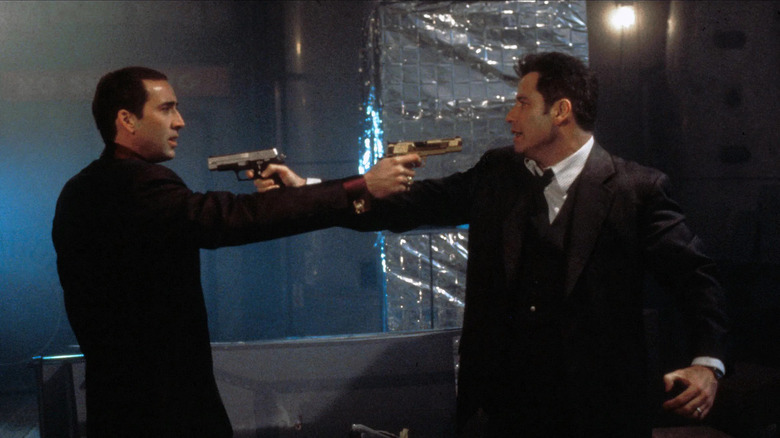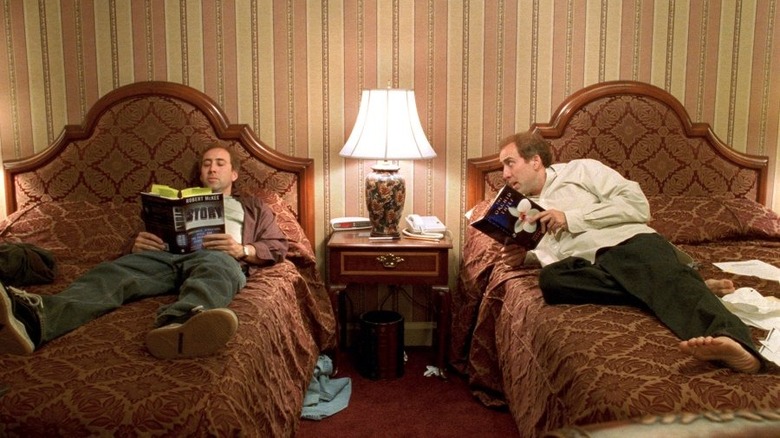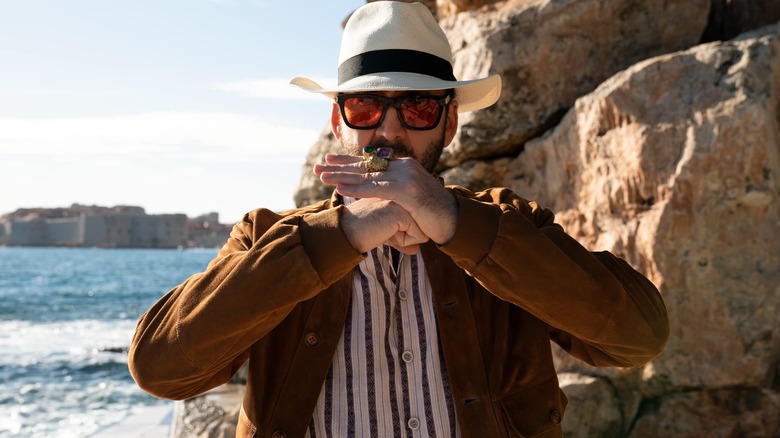The Unbearable Weight Of Massive Talent Ending Explained: A Very Meta Nic Cage Love Letter
For my money, the funniest film of 2022 so far is "The Unbearable Weight of Massive Talent." It's a film that lives and dies on its star — because in "Massive Talent," Nicolas Cage plays himself, or at least a fictionalized version thereof. The in-film Cage has the same filmography, but whereas the real-life Cage recently gave one of his best performances in 2021's "Pig," the movie's Cage is trapped in a rut, having just lost out on a part in the newest David Gordon Green film and continually alienating his ex-wife Olivia (Sharon Horgan) and daughter Addy (Lily Sheen).
With no other options, Cage accepts a $1 million invite to Majorca to be a guest at the birthday party of Javi (Pedro Pascal), his number one (and richest) fan. Javi's passion and fanboyism rub off on Cage, restoring his passion for acting. After befriending Javi, Cage is recruited by CIA agents Vivian (Tiffany Haddish) and Martin (Ike Barinholtz), who believe Javi is the boss of an arms-dealing syndicate that has kidnapped Maria Delgado, a local presidential candidate's daughter. Cage then asks Javi to write a screenplay with him as cover to stay on Majorca and investigate the compound for Maria's location.
Spoilers for "The Unbearable Weight of Massive Talent" follow.
An ending worthy of the silver screen
As Cage jokes, the CIA puts him in the position of "Donnie Brasco," the 1997 film about FBI agent Joe Pistone (Johnny Depp) infiltrating the mafia with the titular alias. Javi is Cage's very own Lefty Ruggiero (Al Pacino). A hero forced to spy on a friend and come to terms with that man being a criminal isn't treading any new ground in Hollywood; however, here it ends much less tragically than usual because it turns out Javi is not a crime boss — his cousin Lucas (Paco León) is.
Unfortunately, before Cage learns this, Javi has invited Olivia and Addy to the island. Cage interprets this as a threat, while Javi is ordered to kill Cage by Lucas after the latter discovers Cage is working with the CIA. Neither Cage nor Javi can kill the other, but by the time they realize each other's intentions, Lucas has kidnapped Addy. Comedy gives way to action-comedy as the two team up to rescue Addy and Maria.
The climax of "Massive Talent" is set to be a shoot-out between Cage and Lucas, but just before it commences, the film match cuts to an in-universe movie of Cage playing a double-fictional version of himself. It turns out that Cage and Javi did end up making a movie together, one based on the birth of the friendship and adventure in Majorca. Once this movie ends, we see the main characters enjoying it at the premiere.
Face/Off's influence
"Massive Talent" is a love letter to Cage's career with references galore. Characters are seen watching his 1997 Jerry Bruckheimer joint "Con Air," while Cage is haunted by an apparition of his younger self, "Nicky," who looks straight out of "Wild At Heart." However, there are two Cage movies to which "Massive Talent" owes the greatest debt.
One is John Woo's "Face/Off." That title is an all-time double entendre; terrorist Castor Troy (Cage) and FBI agent Sean Archer (John Travolta) swap faces and spend the film, well, facing off. "Massive Talent" is littered with references to "Face/Off": Javi identifies it as one of his three favorite films, alongside "The Cabinet of Dr. Caligari" (which Cage had failed to get Addy interested in) and "Paddington 2" (which he then introduces Cage to). It turns out Javi likewise owns a wax replica of Castor Troy (Cage offers him $20,000 for it) and the golden guns which Cage used in "Face/Off." Cage gets to use the guns once more as the action ramps up.
Both films also have dual leads. Neither Archer nor Troy (and by extension Travolta and Cage) can be considered more of a star in "Face/Off" than the other. "Massive Talent" may be sold as the Nic Cage show, but like Travolta before him, Pedro Pascal's screen presence rivals his co-star's.
Why does "Face/Off" get so much focus? "Massive Talent" banks on the popularity of Nicolas Cage memes. The hyper-stylized tone of "Face/Off" means that it contains plenty of the overacting which made Cage a favorite of the internet.
Adapting the structure of Adaptation
The other Cage flick which casts the longest shadow over "Massive Talent" is Spike Jonze's "Adaptation." The script doesn't name-drop it as often as "Face/Off," but its influence is even more vital. In "Adaptation," Cage also played a real-life Hollywood figure, namely the film's screenwriter, Charlie Kaufman. Kaufman had struggled writing a script to adapt Susan Orlean's "The Orchid Thief," so he wrote a movie about his writer's block instead.
The first half of "Adaptation" is purposely aimless, oscillating between Kaufman's professional and personal struggles and flashbacks to Orlean's (Meryl Streep) experiences with horticulturist John Laroche (Chris Cooper) that inspired the book. The film becomes more conventional in its second half, when Charlie starts listening to the advice of his brother Donald (also played by Cage) and Robert McKee (Brian Cox). Kaufman's mode of writing shapes the world around him.
"Massive Talent" uses this same sort of reflexive bait-and-switch. As Cage and Javi develop their screenplay, their ideas reflect their real-life circumstances. The two initially pitch the movie about a friendship between two men, much like themselves. At Vivian's demand, Cage suggests turning it into an action film about the leads rescuing one of the men's kidnapped daughter. This beckons Olivia and Addy's reintroduction and the transformation of "Massive Talent" from one about an unlikely friendship into the exact kind of action film Cage pitched to Javi.
By aping the narrative progression of "Adaptation," "Massive Talent" delivers a double blow. It's not just a meta film because it features Nic Cage playing himself and referencing movies he's been in, the fact that it's meta-text is itself a reference to a Cage movie.
Defining meta-text
Both "Adaptation" and "Massive Talent" are meta-texts — the two films are about the authorial process, specifically in film-making. The movies metatextually reference their own creation, while they also metafictionally draw attention to the artificial nature of their stories.
"Adaptation" implies that Charlie's script is the basis of the film we just watched — after all, that's what the real-life Kaufman wrote. "Massive Talent" ends with the characters watching a cheesier version of the film we just did, albeit with Demi Moore as Olivia and Anna MacDonald as Addy.
Both "Massive Talent" and its in-universe counterpart are action films, despite Javi having previously lambasted Cage's pitch as "terrible." Cage (echoing Vivian) countered that such a plot is needed for wide appeal. This could easily be read as the filmmakers acknowledging their own compromises they made in getting "Massive Talent" made. I don't think it's quite self-flagellation though since Cage ends the film with the comeback he wanted and Javi is now the filmmaker he'd dreamed of being. The lesson? Compromise doesn't have to stifle creative fulfillment. Cage applies this lesson to his personal life by letting Addy pick the film they watch together; it turns out to be "Paddington 2"
The movie premiere conclusion also turns "Massive Talent" into an ouroboros of meta-text; just as a serpent devours its own tail, a film where Nicolas Cage plays himself features a fictional film where the in-universe Nicolas Cage plays a double-fictionalized version of himself. The only thing missing is an in-movie Javi telling Cage they should make a movie about their experiences. It also underlines the conceit of the joke that animated it; Nicolas Cage is such a fascinating and eccentric man that there should be a movie that doesn't just star him, but is about him.
